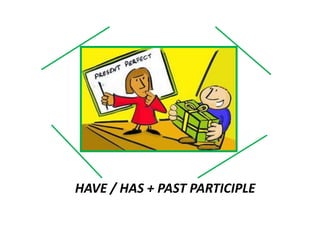
Present perfect
- 1. HAVE / HAS + PAST PARTICIPLE
- 2. PRESENT PERFECT = HAVE / HAS + PAST PARTICIPLE • Se usa HAVE , con los pronombres I, YOU, WE, THEY • Se usa HAS, con los pronombre HE SHE IT I HAVE YOU HAVE HE HAS SHE HAS IT HAS WE HAVE YOU HAVE THEY HAVE
- 3. has have has have have has has have have have has
- 4. PRESENT PERFECT = HAVE / HAS + PAST PARTICIPLE
- 5. PRESENT PERFECT = HAVE / HAS + PAST PARTICIPLE I HAVE AWOKEN YOU HAVE BEEN HE HAS BEATEN SHE HAS BECOME IT HAS BROKEN WE HAVE BEGUN YOU HAVE BENT THEY HAVE BITTEN
- 6. PRESENT PERFECT = HAVE / HAS + PAST PARTICIPLE En español: HABER + VERBO terminado en – ado _ ido _ to Ejemplo: He dado plátanos a los changos. _ so _ cho I have given
- 7. Ha brincado
- 8. He vivido
- 10. AFIRMATIVO NEGATIVO : Agregar NOT después del auxiliar. I HAVE NOT AWOKEN YOU HAVE NOT BEEN HE HAS NOT BEATEN SHE HAS N’T BECOME IT HAS N’T BROKEN WE HAVE NOT BEGUN YOU HAVE N’T BENT THEY HAVEN’T BITTEN
- 11. FORMA INTERROGATIVA Auxiliar HAVE o HAS hacia enfrente.
- 12. AFIRMATIVO INTERROGATIVO HAVE I AWOKEN? HAVE YOU BEEN? HAS HE BEATEN? HAS SHE BECOME? HAS IT BROKEN? HAVE WE BEGUN? HAVE YOU BENT? HAVE THEY BITTEN?
- 13. PRESENT PERFECT = HAVE / HAS + PAST PARTICIPLE hasn’t heard have lost have bought hasn’t got have taken have tried
